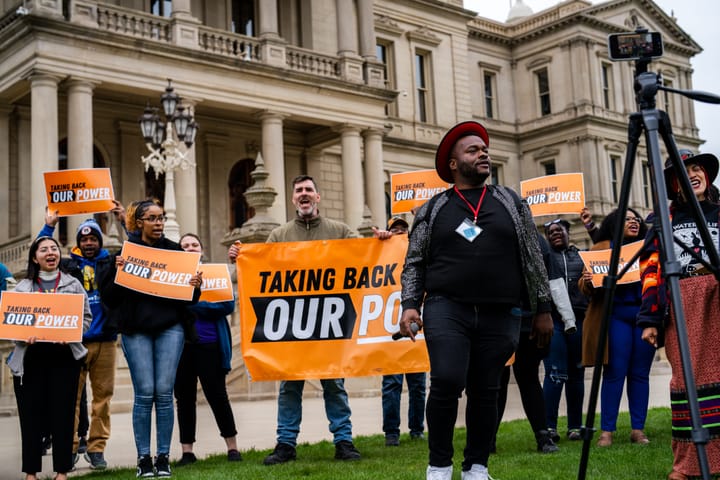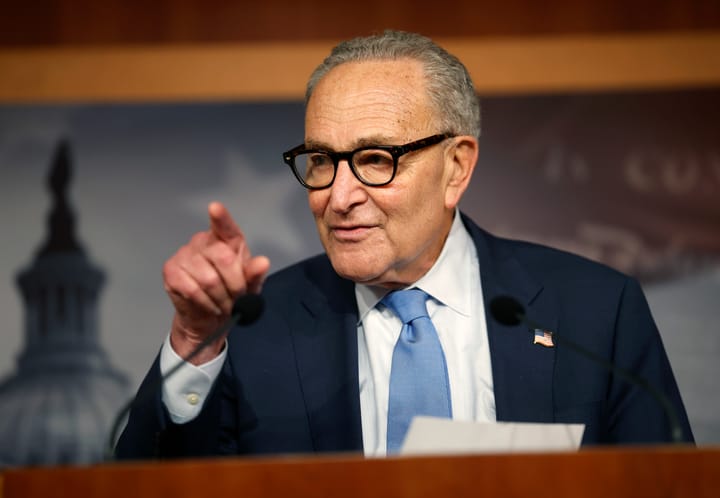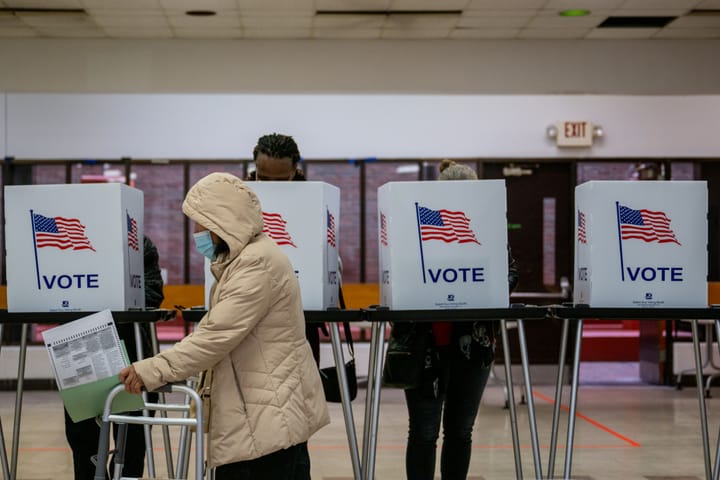Michigan residents pay the highest utility rates in the Midwest, but for decades they have had more power outages than just about any other state. The nonprofit news outlet Bridge Michigan reported earlier this year that the state’s residential power bills are 17% higher than the average in Great Lakes states, with only two other states, Texas and California, experiencing more major outages.
A coalition of community and environmental groups in Michigan are calling for a legislative fix that aims to restore accountability in service delivery and rein in rising rates. Formed in February, the Taking Back Our Power coalition is urging state lawmakers to pass legislation that would prevent regulated monopoly corporations like electric companies DTE Energy and Consumers Energy from making political contributions.
Time is running out to pass the reforms, the coalition says. The Michigan legislature is now in its lame-duck session, and next year, the state House will flip to Republican control, with the GOP taking a 58-52 majority in the elections. The changeover will break up a Democratic trifecta in the state obtained in 2022.
The bills that would block regulated energy companies and other monopolies from political giving are House Bills 5520 and 5521, sponsored by state Rep. Dylan Wegela (D). A pair of related bills, HB 5975 and 5976, sponsored by Rep. Donavan McKinney (D), would bar major government contractors and companies seeking government contracts from covered political contributions. All four bills are supported by House Majority Floor Leader Abraham Aiyash, who has called the utility company contributions to state officials a “major conflict of interest.”
Fifteen states and the federal government limit political giving by regulated monopolies or government contractors, according to the coalition.
The state’s two biggest utilities, DTE and Consumers, are hefty corporate donors: at least 102 of the 148 sitting lawmakers have received PAC donations from them in recent years. State legislators have considered rules for utilities like compensation after long outages, but the two utilities have deflected pushes to pay out more customer credits.
Watch full conversation with Michigan groups on YouTube >>
A recent poll found that the vast majority of Michiganders support barring contributions from monopolies and government contractors. In a survey of state voters by the firm Emma White Research, 81% of voters supported a bill to limit contributions from regulated monopolies and government contractors. The popularity is strong across partisanship: among the respondents, 90% of Democrats favored the measures, 84% of Independents, and 66% of Republicans.
The legislation’s rollout was accompanied by rallies from the coalition, whose members include Clean Water Action, Climate Cabinet, Community Change Action, Detroit Action, Detroit Jews for Justice, Emergent Justice, Michigan Environmental Justice Coalition, Michigan League of Conservation Voters, Michigan United Action, MOSES Action, and Voters Not Politicians.
With an organizing push from the coalition, 26 state lawmakers have joined the Taking Back Our Power pledge in support of the legislation, which says, “Stopping these companies from manipulating our democracy through political spending means Michiganders can vote with more faith that their voice matters."
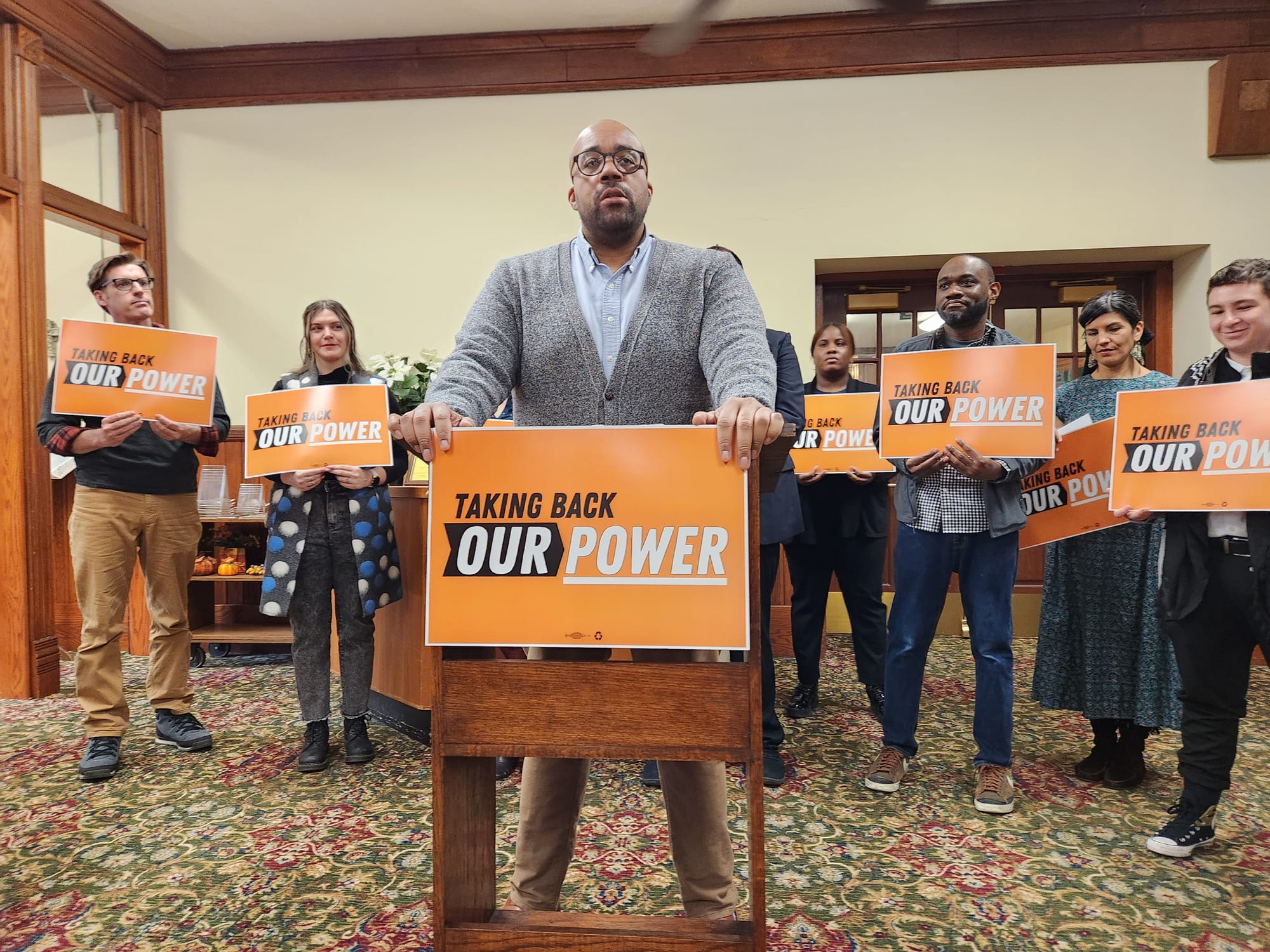
Last week, the bills got a boost from the endorsement of the United Auto Workers (UAW) and Service Employees International Union (SEIU). The large labor unions included the measures in a list of legislation they called on Democrats to pass in the lame duck, saying the Wegela and McKinney bills would “fight back against corporate greed by fighting corporate influence in our politics and policy making.”
Coalition groups tell Sludge that the upcoming week in the state legislature’s calendar is critical if Michigan Democrats are to live up to their commitments to make progress on pocketbook issues for working families. Scott Holiday, executive director of the community group Detroit Action, said, “I think this is an opportunity for Democratic leadership to show voters that they're standing with working people for once, despite the pressure from corporate donors.”
“Right now we're in this lame-duck session,” said Em Perry, organizing director of the nonprofit Michigan United. “It's really the last chance for the Democrats that hold the majority for just a little bit longer to do the right thing and show that they actually do support their constituents and the working class—and care about health care, and environmental justice, and all the things that they say.”
Nichole Keway Biber, campaign organizer with Clean Water Action, said of the campaign, “We want to get to the point where we can come forward with the solutions that we have had for decades now, on how this could get better, and have a chance to bring that onto the agenda—without always having to push back against the outsize influence of those with the money to influence our politicians, who are supposed to be our representatives.”
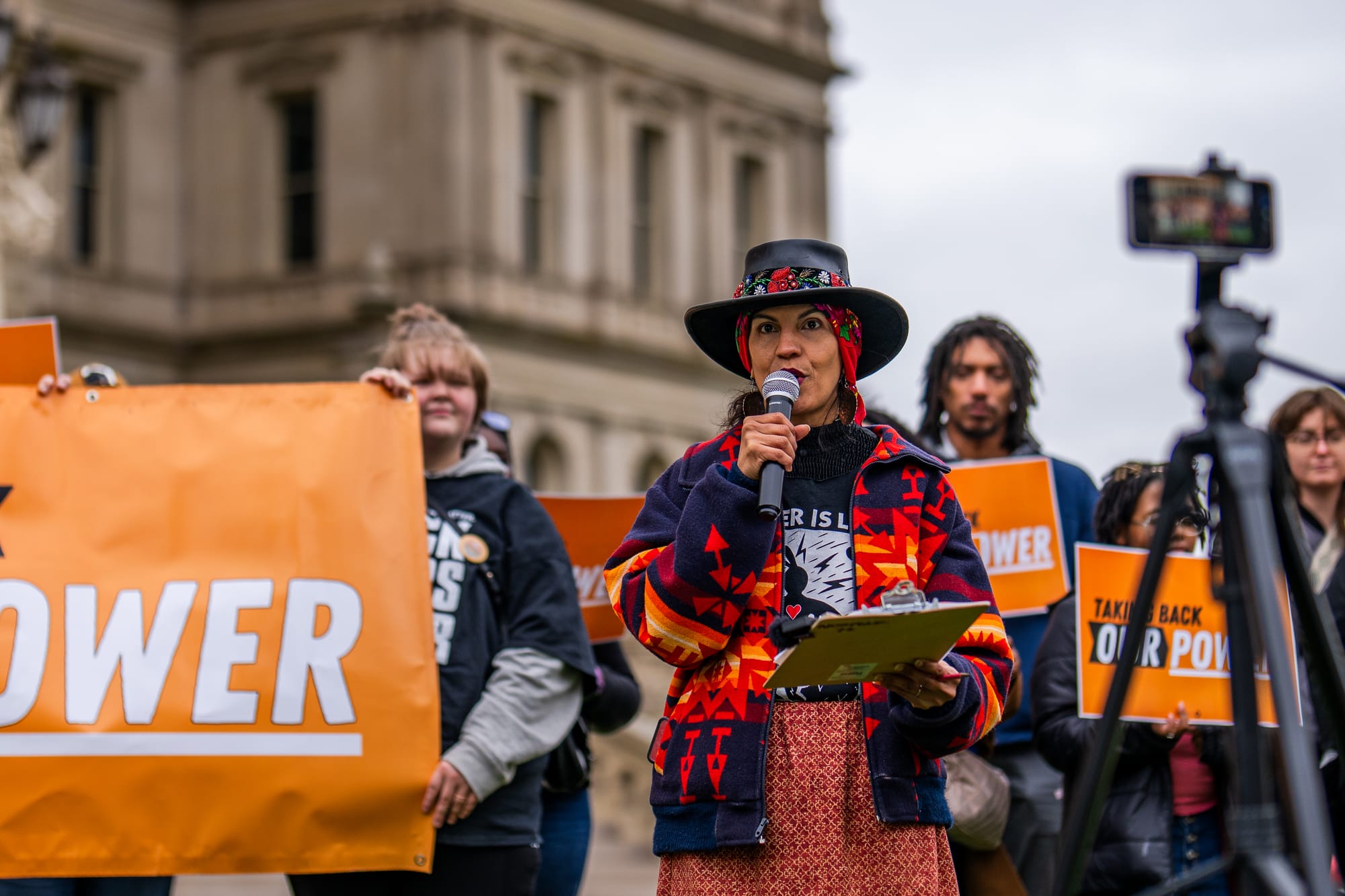
House Bills 5520 and 5521 would prohibit contributions from electric or natural gas utilities to a number of committees for candidates and state parties, as well as 501(c)4 or 527 organizations controlled by a candidate or state official. House Bills 5975 and 5976 would prohibit other large state contractors (those with $250,000 or more in awards, or those seeking government contracts) from making political contributions, which the Taking Back Our Power coalition says would cover state giants like Blue Cross Blue Shield of Michigan, Comcast, and insurer Delta Dental. The period of the prohibition for contractors would be 18 months before a contract, during its term, and 18 months after its termination.
The Costs of Outages
First-term state Rep. Wegela introduced the legislation to block power utility donations in February, saying, “It is much cheaper for these corporations to spend money buying influence in the political process than it is for them to improve the quality of their services.”
A pair of storms last year knocked out power to more than 700,000 customers, beset by an unreliable energy grid. The number of major outages in Michigan has been rising over the past three years, data shows, and thousands of outage complaints were lobbed into the Michigan Public Service Commission last year. In introducing his bill, Wegela pointed to the need for the companies to be held accountable for addressing the causes of frequent outages: upgrading the power grid, trimming trees, burying power lines, and the like.
Perry of Michigan United says the group’s listening sessions statewide zeroed in on not only the monetary cost, but also the wider disruptions of power outages that can last eight hours or longer.
“We have many folks that are not only disabled people, but elderly people and folks that just run into different medical issues that end up being bankrupt or just struggling financially for so long because of medical bills and then public power,” said Perry.
Perry said the group has been door-knocking and holding meetings at institutions like churches to have conversations about what mattered most to communities, and what they heard back was access to affordable and universal healthcare, followed by the importance of public oversight of energy utilities, toward improving on environmental concerns and restoring accountability.
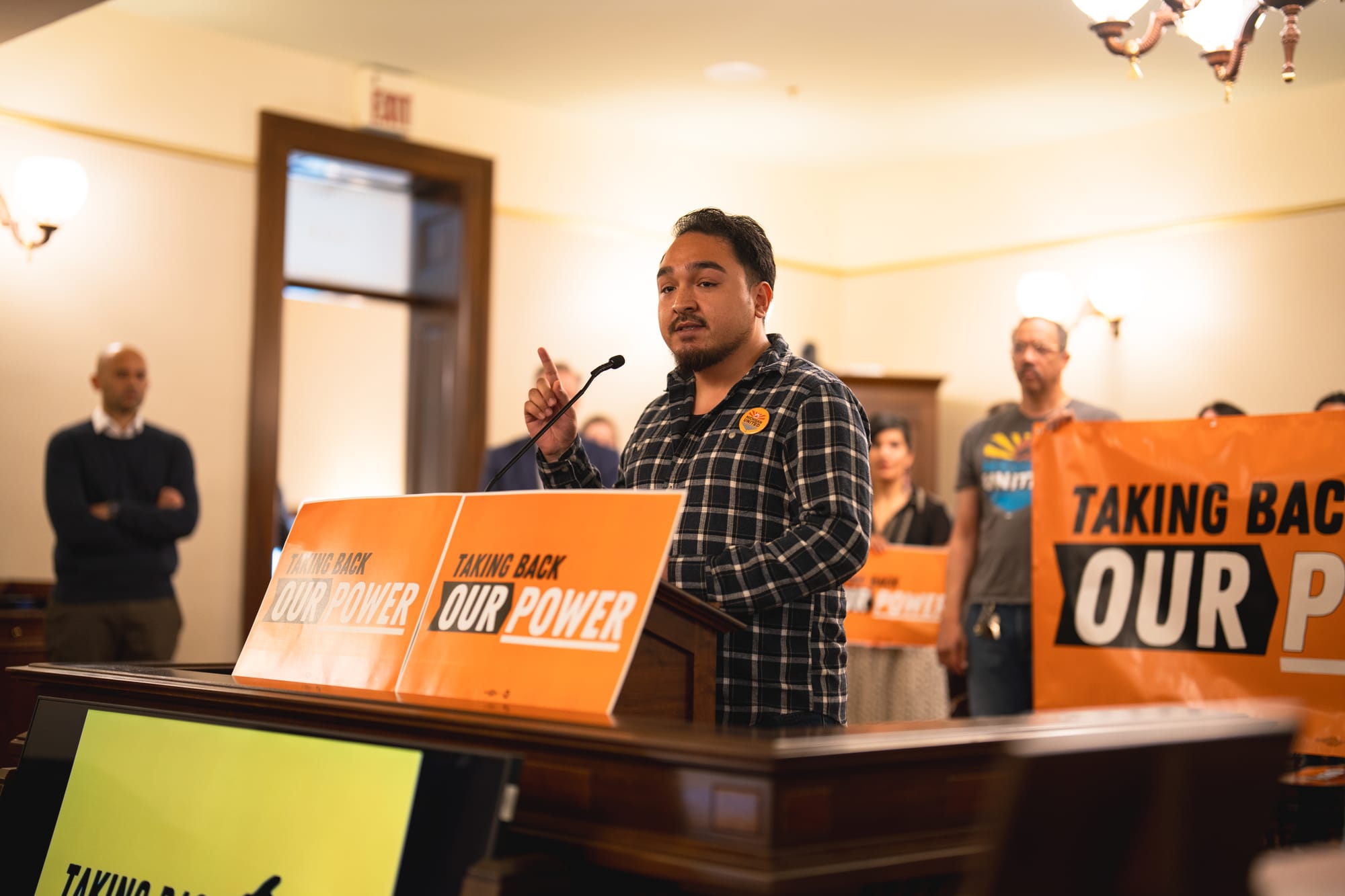
“We have these ridiculous power outages where people are losing hundreds of dollars or more,” Perry said. “And not just the generator costs, hotels, and spoiled food, but irreplaceable things, like breast milk, medication, and much more.
Michigan ratepayers “keep fighting to get any sort of reimbursement. Instead, they just get another rate hike and another rate hike every single year,” Perry said. “That's because our legislators that we are electing, whose job is to represent their constituents, are being bought and paid for by these exact corporations, by DTE, by Consumers Energy… and they're drowning out the voices of the people.”
DTE requested that state regulators approve a $456 million rate increase, an almost ten percent increase for residential customers that Michigan Attorney General Dana Nessel deemed excessive.
Holiday of Detroit Action said that the group has built support for the pledge through lobby days in the state capital of Lansing, having members call and email legislators, and setting up in-district meetings.
Holiday said the group, of working-class Detroiters from communities of color, is driving for transparency in state government from the utility companies. “From what we know, the response from the past two years is less addressing the grid and more pumping money into their advertisements, and making themselves look like good community partners,” Holiday said. “And I think that a good community partner is one that is responsive to the community that it serves, and is governed by the body that is supposed to govern it.”
While Michigan Democrats opened the first 100 days of their trifecta by passing a slew of progressive bills, the American Prospect reported this month, the lame-duck session has been dominated by corporate subsidy legislation, overshadowing criminal justice reform, public health, and other measures.
Biber of Clean Water Action told Sludge, “When people bring forward their stories of struggling with utilities, struggling with the power outages, they're largely both outraged and mystified as to how this keeps happening, year after year.
“People have solutions at the ready on what they would need to improve reliability, improve the water quality, take care of long-neglected matters,” Biber said. “The reason they're neglected is because of corruption. Then we need to get rid of the corruption.”
Millions in Donations From DTE and Consumers
Jonathan Hogstad, director of strategic campaigns and strategic research for the multiracial democracy and economic justice organization Community Change, said the Michigan legislation follows precedent in other state governments’ regulations. “It's been called, a little wonky term, anti-pay-to-play,” Hogstad says. “The courts have affirmed that states, despite the Supreme Court decision in Citizens United, are allowed to ban political contributions under an anti-corruption framework.
“Then we looked at all of the top corporate contributors, and virtually all of them were government contractors or regulated monopolies,” Hogstad said. “If your business model is predicated on disproportionate influence over elected officials, it's just a simple return on investment.”
In an FAQ document for lawmakers shared with Sludge, the coalition pointed to similar measures that have been made law in Connecticut, Hawaii, New Jersey, and Georgia that limit contributions by government contractors, aiming to reduce “pay-to-play” corruption.
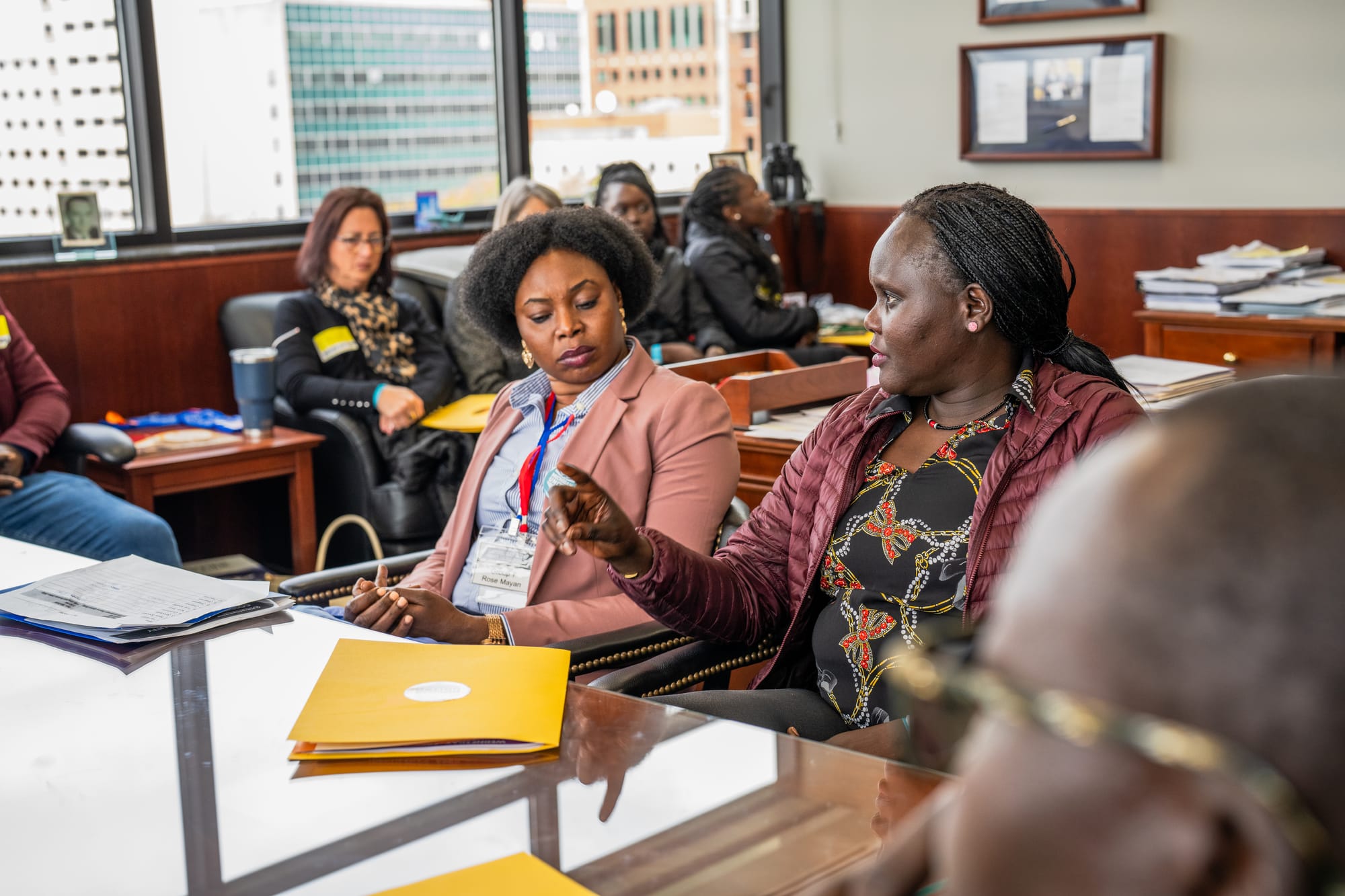
Research from Taking Back Our Power, shared with Sludge, found that 14 of the top 20 corporate contributors in Michigan are regulated monopolies, government contractors, or their lobbyists, according to their review of data from the state-level resource FollowTheMoney. According to the analysis from the coalition, which includes contributions to state party committees and candidates over the past 10 years, DTE Energy has given at least $2.8 million and Consumers Energy has given at least $1.8 million in the state. The utilities trail only corporate giant Blue Cross Blue Shield of Michigan’s $3.4 million given over that time. Due to gaps in disclosures, these figures do not include several major avenues of influence spending: donations to leadership PACs, which politicians use to advance in caucus leadership, and donations to “dark money” 501(c)4 nonprofits, which do not appear in campaign finance records. Both DTE and Consumers have funneled large amounts into non-disclosing groups that made donations and promoted candidates.
“This shouldn't be a radical thing,” Hogstad said. “If we want to actually have utilities that provide affordable, dependable energy, we can't allow them to have the power that they do.”
DTE and Consumers Energy were major corporate donors to Michigan Republican legislators who sought to advance restrictive voting measures in 2022, before losing the House majority. Michigan groups in the Defend Black Voters coalition had called out both utilities in protests over the voter disenfranchisement proposals.
Hogstad mentioned that in the recent poll, Republican respondents’ support rose the most when presented with the best arguments on both sides, rising from 66% to 80%. “You have to go to something like ice cream if you want to get that kind of bipartisan agreement,” Hogstad told Sludge. “There's nothing in today's world that has, from a voter's perspective, that kind of support across the spectrum.”
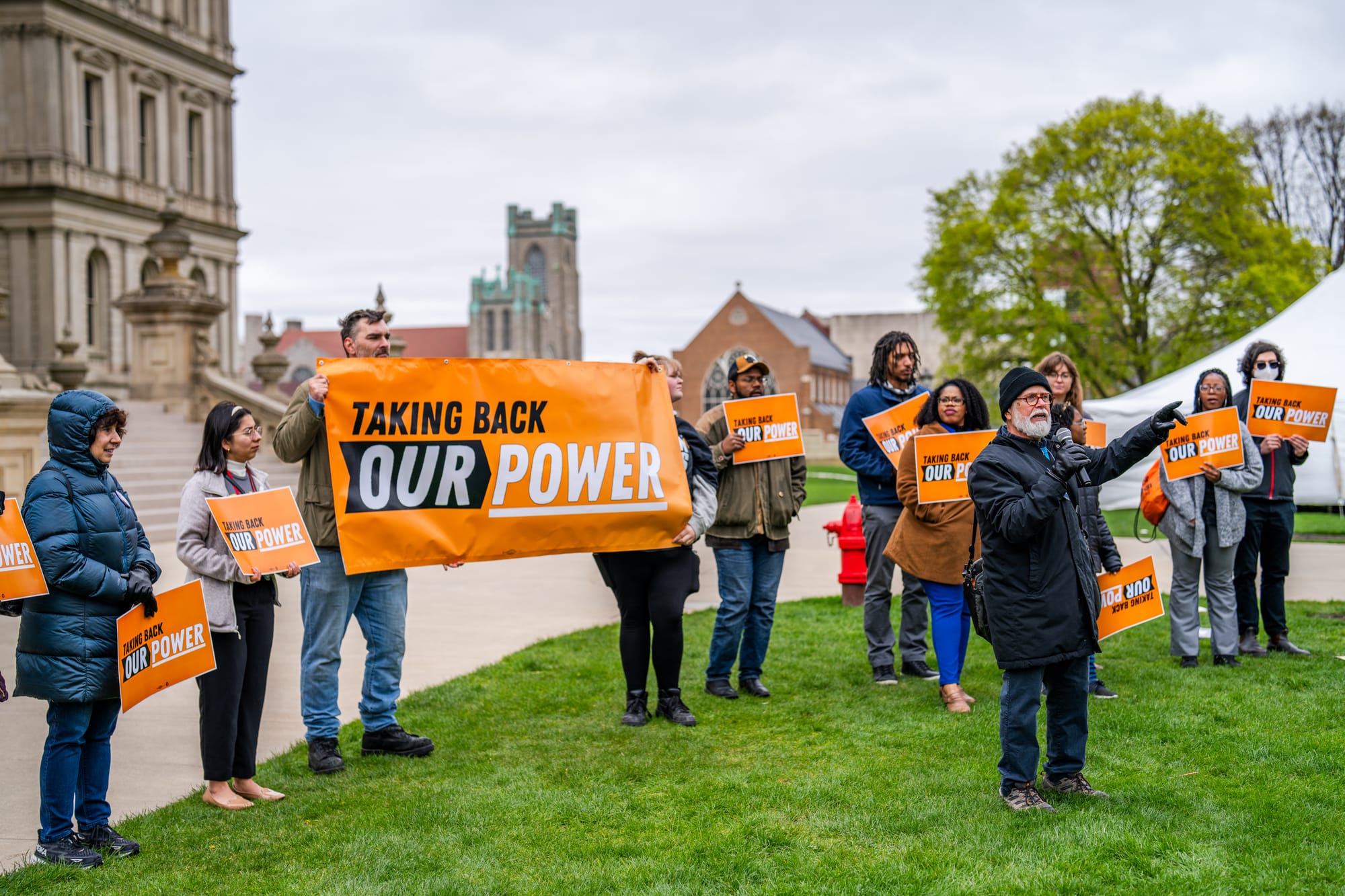
Utility companies have been behind headline-grabbing political scandals over the past decade, as documented in a January 2023 report titled “Getting Politics Out of Utility Bills” from the watchdog Energy and Policy Institute, which recommends states adopt tighter limits on utilities’ political donations. In Ohio, FirstEnergy was recently ordered to pay $100 million for its role in a $61 million bribery scheme involving dark money groups and the state General Assembly. In Florida, a dark money group coordinated with electric monopoly Florida Power & Light to run so-called “ghost candidates” to pull away votes. In Illinois, powerful former Illinois House speaker Mike Madigan was charged with racketeering and bribery, including for demanding jobs and contracts from the state’s largest utility company ComEd. The Madigan trial is underway. In the 10 states that elect their utility commissioners, the nonprofit newsroom Floodlight reported last month, more than a third of the contributions of $250 or larger that commissioners raised came from fossil fuel interests and electric utilities.
Electric utility monopolies also use funds from captive ratepayers for lobbying pushes of legislators and regulators, according to a September report on reforming the utility system from the nonprofit American Economic Liberties Project (AELP). The group mentions Dominion Energy in Virginia, which was caught trying to bill customers for $9 million a year in dues to trade associations. The volatility of energy generated from fossil fuels, AELP’s report notes, disproportionately affects low-income and moderate-income families, citing research from the nonpartisan Rocky Mountain Institute that one in seven U.S. households has an average energy burden of 14% or more.
Biber said that anti-corruption measures are popular with Michigan voters because they've seen how an issue as straightforward as access to clean water is treated by corporations as an inconvenience. “It's a matter of whether we’re considering the bottom line for these very lucrative companies, or are we going to consider the basic needs of the people, things like homes with reliable utilities, health care, and also something as basic as water,” Biber said.
“So Taking Back Our Power, really, it's taking back our power to come forward with our good ideas,” said Biber.
Sludge video produced by Spencer Snyder
